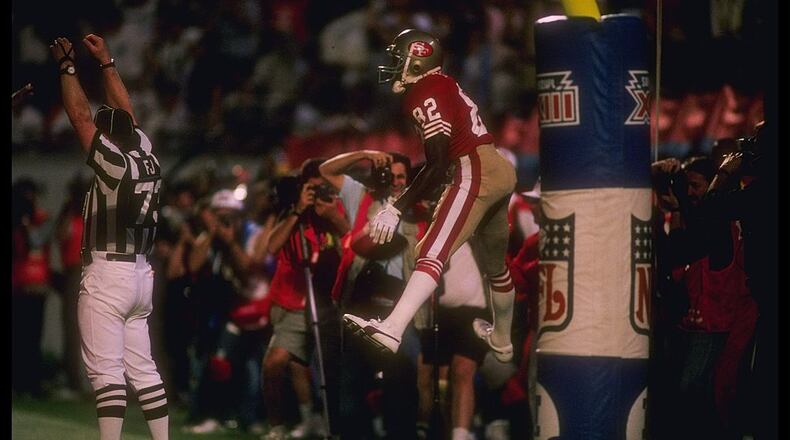“I was in shock that day,” the 79-year-old widow said recently while sitting in her Lindenwald home. “I’m in shock again.”
That’s because the hometown Bengals, who hadn’t appeared in a Super Bowl since 1989, in fact hadn’t won a playoff game in 31 years, are one victory away from the team’s first NFL Championship.
For those who said it would never happen again, let’s just say it will much warmer today in Inglewood, Calif., site of Super Bowl LVI, than frozen over hell.
Weeks never expected to watch the 1988 Super Bowl in person. But her brother, Pat Case, purchased two Super Bowl tickets from a friend in California and when a work commitment interfered with his plans, he offered the game tickets, airline tickets and hotel room to his sister and her friend, Judy Stout, both whom worked for his real estate publishing company.
Case said the tickets had a face value of $100. He paid about $200 each, or about the price of parking, a hot dog and beer at this year’s Super Bowl at SoFi Stadium.
“All we had to do was show up,” Weeks said of her brother’s arrangements.
Well, that and keep an eye on their pancakes at a Miami fast-food restaurant.
There was a McDonald’s near their hotel. They decided to eat breakfast there one morning. But when Weeks got up from the table to refill her coffee cup and Stout walked to the counter to get some condiments, a homeless man sat down and started eating their food.
Welcome to Miami, ladies.
On the morning of the Super Bowl, Jan. 22, 1989, they learned that the Bengals star fullback Stanley Wilson was caught using cocaine in his hotel room the night before. The Bengals had no choice but to leave him off the roster. It was Wilson’s third violation of the league’s drug policy, and as a result he was banned from the league for life.
Then as they sat in their end zone seats, they were surprised that radio personality and former Bengal tight end Bob Trumpy was standing on the sidelines with a cigarette dangling out of his mouth.
But the most disturbing sight happened during the game: Quarterback Joe Montana kept completing passes to wide receiver Jerry Rice, who caught 11 balls for a Super Bowl record 215 yards and a touchdown, earning MVP honors.
Down 16–13, San Francisco got the ball on its 8-yard line with 3:10 left and marched 92 yards. They scored the winning touchdown on a Montana pass to John Taylor with 34 seconds remaining.
While the rest of the 75,129 fans filed out of the stadium, some joyous after the 49ers won their third Super Bowl, Weeks and Stout sat there stunned. They couldn’t believe what they just witnessed.
“We kept saying, ‘What the heck just happened,’” she said. “We thought we were going to win that game. That loss knocked the wind right out of you.”
As they prepared to fly back to Hamilton two days later, there were newspaper boys hawking papers on the street corner, screaming “Bundy is dead.”
Ted Bundy, who confessed to 30 homicides committed in seven states between 1974-78, was executed at Florida State Prison on Jan. 24, 1989.
Weeks still has her Super Bowl ticket and cushion. She gave her brother the game program. Every year at this time she pulls out the ticket and wonders if she, or the Bengals, will ever see another Super Bowl.
She has to wait just a few more longer hours until kickoff.
“Can we win?” she said, repeating the question. “I got to think that. I don’t want to be shocked like that again.”
She paused for a second, then added: “Not unless it’s a good shock.”
Credit: Rusty Kennedy
Credit: Rusty Kennedy
About the Author


